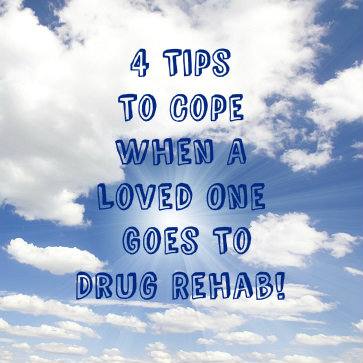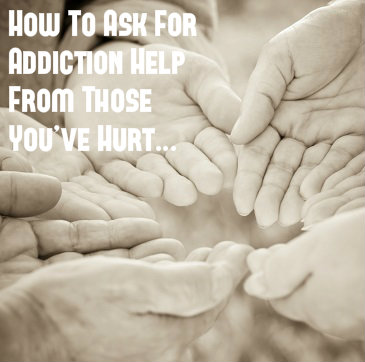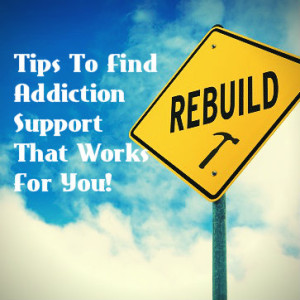11 Aug 2014
Empowering Addicts
Shame and stigma are two of the most common words associated with being an addict, both for those using and those in recovery. As a society we still largely view addiction as a moral failing, while science keeps telling us it is a medical condition. Too many addicts fail to get help because of the shame they feel and the stigma attached to the condition. When we can empower addicts to seek treatment instead of shaming them, we all benefit.
Empowerment Over Shame Of Addiction
 Addiction has long been viewed as shameful for many reasons. Abusing substances does begin with a personal choice. No one is forced to use drugs or to drink. For this reason we have long assumed that addicts continue to have a choice and that they can always choose to stop using and turn their lives around. What many fail to realize is just how powerfully drugs and alcohol impact the brain and body. Substances that are highly addictive change the brain and make it almost impossible to stop using them.
Addiction has long been viewed as shameful for many reasons. Abusing substances does begin with a personal choice. No one is forced to use drugs or to drink. For this reason we have long assumed that addicts continue to have a choice and that they can always choose to stop using and turn their lives around. What many fail to realize is just how powerfully drugs and alcohol impact the brain and body. Substances that are highly addictive change the brain and make it almost impossible to stop using them.
As researchers in addiction uncover these truths, we should start to view addicts differently, but it takes time to change minds. We need to move toward empowering addicts, rather than making them feel ashamed. Empowerment means being educated about the disease of addiction and having the confidence to get much needed treatment. When we can empower addicts, we can better help them.
Taking Action To Empower Addicts
The good news is that ideas about and attitudes toward addiction are changing. It takes time to make a societal shift, but slowly and surely it seems to be happening. There are people who are taking specific actions to lift the stigma attached to addiction and to empower addicts as a whole and as individuals.
For instance, a new trend is taking place that involves gathering recovering addicts in large groups to celebrate recovery and sobriety. In the UK, the Brighton Recovery Walk is in its fourth year, while the nationwide UK Recovery Walk is on year six. These events include a large gathering of recovering addicts, out to celebrate their sobriety without shame. These recovery walks show the faces of addiction and battle the stigma of this disease with a positive message of hope and empowerment. Similar events have begun to pop up in the U.S. as well.
Other empowering actions work with individual addicts. For instance, Stanford University created a program to educate women in recovery in the humanities. The lessons these women learn help to empower and strengthen their recovery by teaching them about facing obstacles, giving them new perspectives and expanding their horizons. Most of all the courses show them that they are worthy of learning and of working with Stanford professors.
Empowering Individuals In Your Life
If you have an addict in your life, consider how you can empower her. Educate her about her disease and options for treatment. Help her by supporting her when she needs it and by being there during difficult times. Encourage her to attend events like the Recovery Walks and to seek out other programs that are available to help women like her.
The more you talk about addiction and refuse to treat it like a shameful series of choices that someone has made, the more we can empower all addicts. With empowerment comes the confidence to reach out and get help. Today we have a number of ways to treat addicts that are effective and no one should feel too ashamed to ask for that help.
Check Out Additional Recovery Inspiration Posts!
09 Jul 2014
4 Tips To Cope When A Loved One Goes To Rehab
If you have a loved one struggling with addiction, getting her into rehab has probably been your top priority. Now that she’s gone, how do you cope? An important person is missing from your life. You have cared for her, been there for her, tried to help her overcome her addiction, and now you have turned your responsibilities over to someone else. You may be experiencing feelings of loss or guilt. Now is the time to learn how to take care of you, how to feel comfortable letting go, and how to get ready to have a sober loved one return home.
1. Learn About Addiction And Treatment
 Information is power and knowing more about what your loved one is going through will help you to better understand her. It will also help you to feel connected to her while you cannot be together. Read up on addiction, what it is, what it means for the addict, and how it impacts everyone around the addict. Learning about this disease will give you important insights into your situation.
Information is power and knowing more about what your loved one is going through will help you to better understand her. It will also help you to feel connected to her while you cannot be together. Read up on addiction, what it is, what it means for the addict, and how it impacts everyone around the addict. Learning about this disease will give you important insights into your situation.
You should also learn more about addiction treatment so that you know what is happening with your loved one at rehab. You may not be able to hold her hand through the process, but you will feel more comfortable when you understand what it entails. It may also be possible for you to get involved in her treatment at some level. Most rehab facilities offer family counseling as a component of treatment. Be sure to volunteer for these sessions to give you a chance to see your loved one and to participate in her care.
2. Join A Support Group
Being on the outside can be tough. You want to be there with her, helping her along the way. Surrendering that control to others is not always easy. One important way to cope with your feelings is to share with and learn from others. There are numerous support groups available to help the loved ones of addicts. They can be general groups that include all loved ones of addicts, or more specific. The great benefit in joining a support group is to share the burden of your grief, your guilt and all the other negative emotions attached to your loved one’s addiction and treatment.
3. Find Your Passion
As you learn to cope with having temporarily lost your loved one to rehab and treatment, it is important that you tend to yourself. For a long time you have cared for the addict in your life. You have looked out for her needs and spent so much of your time and energy worrying about her. Now that she is in the capable hands of treatment specialists, you can take care of you.
One of the best ways to do that is to focus on what you love to do. Return to an old hobby that you once felt passionate about or try something new that you have always wanted to do. The road ahead will be difficult and having something that’s entirely yours that you feel passionate about will help you cope both now and in the future.
4. Accept And Trust That Everything Will Be Ok – No Matter What
Having a loved one in rehab can be stressful for you. Just remember that you have left her in good hands with professionals who have experience treating addicts and who care about the patients they treat. Also remind yourself of how necessary this step was. She would never have been able to heal without professional treatment. Take care of yourself, participate in her sessions where possible and be ready to welcome back your sober loved one.
Read Our Other Posts For Friends And Family Of Addicts – Recovery Is Possible – Call Us Now To Begin The Path To Healing And Freedom From Addiction!
Asking for help is never easy. It means admitting something you’d rather not and that you need other people. When you need help for addiction you may also feel ashamed or guilty. Perhaps most difficult is asking for help from the loved ones who have suffered because of your addiction. Asking for help is crucial because no one can overcome addiction alone. Be brave and talk to the loved ones you hurt. You may be surprised to find they still support you, no matter what.
How Do I Get Past the Shame Of Addiction?
 Shame is a terrible symptom of substance abuse and addiction and a common roadblock to asking for help. Understand that it is normal to feel this way. The natural response to the shame that accompanies addiction is to bury it and to deny having a problem, but this won’t help you in the long run. Shame means realizing that you are imperfect and once you accept that fact, asking for help becomes easier. No one is perfect and knowing this fact can help you connect with your loved ones who will most likely be ready to support you, even though you hurt them in the past.
Shame is a terrible symptom of substance abuse and addiction and a common roadblock to asking for help. Understand that it is normal to feel this way. The natural response to the shame that accompanies addiction is to bury it and to deny having a problem, but this won’t help you in the long run. Shame means realizing that you are imperfect and once you accept that fact, asking for help becomes easier. No one is perfect and knowing this fact can help you connect with your loved ones who will most likely be ready to support you, even though you hurt them in the past.
Learning more about your addiction can also help you to let go of shame. Read up on addiction and the latest research findings and you will see that it is a disease. Being addicted started with a choice you made, but it persists because it is a true illness that affects you physically and psychologically.
How Do I Get Past The Fear Of Rejection?
Another major roadblock to asking your loved ones for help is the fear that they will turn their backs on you. Why shouldn’t they? After all, you have broken their trust, let them down and maybe you even hurt them emotionally or physically because of your addiction. You probably see yourself now as unworthy of their love and help.
You have to see yourself as worthy of your loved ones’ time and attention. If you can’t see that, you may never ask for the help you desperately need. Think back to a time before your addiction. Remember the kind of person you were and the relationships you had with your family. Maybe you and your sister were best friends. You can probably remember a time when you were a help to your parents, rather than a burden. When you can remember the positives in the past, you can imagine a future in which you are sober again. Your loved ones will remember the old you too and will not likely reject your request for help.
How Do I Ask For Help?
Once you have recognized, acknowledged and gotten past your shame and fear, it’s time to take action. First, pick the person you think is most likely to be ready and willing to support you as you seek recovery from your addiction. For most people this means turning to a close family member, like a parent or a sibling. You know your family and friends best, so choose the person or people you think will help you in spite of all you have done to hurt them.
It never hurts to practice, so plan what you want to say. You might want to start with apologies, but be sure to stick with the main message, which is that you are ready to get help. Acknowledge out loud to your loved ones that you hurt them. They will appreciate that you are not ignoring your past wrongs. Also find a time that is conducive to a long talk. Don’t stop your loved ones on their way out the door. Take the time to find your voice and the courage you need to speak up. You may be pleasantly surprised to find that your loved ones are still there for you.
Read Our Other Inspirational Addiction Posts – Healing From Addiction Can Be Yours Today!
20 Jun 2014
Do Genes Equal Destiny In Addiction?
We know that genes play a role in the development of addiction. No single gene determines whether a person will become addicted to drugs or alcohol because addiction is a complex and chronic disease. There are multiple genes that influence addiction, and environment plays a role as well. We know that genes are important because the number one risk factor for predicting addiction is family history. If you have a family history of addiction, you probably have some of the influencing genes. This does not mean that you are destined to become an alcoholic or a drug addict. It does mean, however, that you need to be aware and careful.
Addiction Is A Complex Disease
 Addiction is not a simple matter of one gene causing the disease. It is also not as simple as defining anyone with a family history of addiction as an addict or future addict. There are so many factors, both genetic and environmental, that influence addiction that it may never be possible to accurately predict if someone will develop an addiction. Because family history is such a strong risk factor, we can be sure that genetics play some role.
Addiction is not a simple matter of one gene causing the disease. It is also not as simple as defining anyone with a family history of addiction as an addict or future addict. There are so many factors, both genetic and environmental, that influence addiction that it may never be possible to accurately predict if someone will develop an addiction. Because family history is such a strong risk factor, we can be sure that genetics play some role.
Those without a family history of addiction may also develop addiction. This shows that environment plays a role as well. Experiencing childhood trauma, such as abuse, or having a mental illness can influence the development of addiction. Still, just because there is a family history of addiction or a personal experience of negative environmental factors does not mean you targeted or marked for life. You still have choices to make about abusing substances.
What If I Have A Family History of Addiction?
With a family history of addiction, you may be carrying some genes that could make you more susceptible to addiction. Remember, though, that drinking or using a drug for the first time is a choice you make. Once you have tried them, you may be more likely than the average person to become addicted, but you never have to take that first step. Genes do not push you to try illegal drugs or to get drunk.
If you are worried about becoming an addict, there are some important steps you can take:
- Abstain -The first and most important thing you can do is simply to abstain from drinking at all and from using illegal drugs. If you need to use prescription drugs that are habit-forming, follow your doctor’s instructions regarding dosing and talk to your doctor about addiction concerns.
- Seek counseling – If you have a family history of addiction, someone in your life likely caused you emotional distress, or worse, because of their addiction. Talking about it with a therapist can help you resolve any issues you have regarding this person and can help strengthen your determination to stay sober.
- Choose sober friends – If you have never struggled with addiction yourself you do not necessarily need to stay away from people who drink, but it can help to surround yourself with friends who also choose sobriety. When you spend too much time with people who are drinking or using drugs, they may try to pressure you to join in. You don’t need that extra pressure.
- Develop a healthy lifestyle – A great way to ensure that you don’t need to use drugs or alcohol is to live a life where there’s no room for substance abuse. Develop a strong social life with supportive friends and family. Engage in fulfilling and enjoyable hobbies and activities. Eat regular, well-balanced meals, exercise and stay healthy and you will have no need for substance abuse.
Always remember that genes for addiction are not destiny. You have the power to make choices in your life and to create the kind of life you want to have. By staying positive, surrounding yourself with supportive people and avoiding drugs and alcohol, you will be taking proactive steps that will make it less likely that family history will repeat itself.
Call Us Now If You Or A Loved One Is Struggling With Addiction – We Are Available 24/7!
11 Apr 2014
How To Forgive Your Alcoholic Parent
Forgiveness, as the experts say, is a choice. If someone has wronged you, you cannot wait for forgiveness to appear. You must make a conscious decision to forgive. You also cannot wait for the person who wronged you to apologize. It may never happen. Forgiving someone is a personal choice and one that can give you many benefits. Researchers know that by actively forgiving, you can expect to experience less stress, better relationships, less depression, and even lower blood pressure and a lowered risk of substance abuse.
If the forgiveness you are considering means letting go of the harm and neglect you faced as a child because of a parent’s alcoholism, it will not be easy. Whether your alcoholic parent physically abused you, or simply was never there for you emotionally, you suffered greatly as a result. Forgiveness may be something you have considered, but are struggling to get through. With some understanding, compassion, and a suspension of resentment, you can forgive and move on with your life.
 The Harm Caused By An Alcoholic Parent
The Harm Caused By An Alcoholic Parent
The reason forgiving your mother or father is so difficult is that they caused so much damage in your life. When the children of alcoholics become adults they often experience their own struggles with substance abuse. You are also vulnerable to depression, you may have low self-esteem, and you probably struggle to maintain healthy relationships. If you were physically abused by your alcoholic parent, the repercussions may be more extreme.
Can You Learn To Understand An Alcoholic?
If you have managed to avoid having a substance abuse problem yourself, you may have a hard time understanding your alcoholic parent. However, your path to forgiveness may begin with compassion and understanding. Read up on the disease of alcoholism and try to learn why certain people are vulnerable to it and the impact it has. You may even want to talk to your mother or father about it. If he or she is willing to open up, you can learn just what the struggle has been like. Maybe your parent experienced abuse as a child. If you can understand the motivation behind your parent’s drinking, you may find the compassion to forgive.
Can You Let Go Of Resentments?
One of the biggest roadblocks to forgiveness is resentment. This ugly specter lives with you day in and day out. The more you think about how your alcoholic parent impacted your life in a negative way, the bigger this resentment becomes. It is a toxic feeling and will hinder you in everything you do. Even if you cannot yet forgive your parent, learn to let go of the resentment so that you can better function.
Remember The Good Times
Few alcoholic parents are so terrible that they never cared for their children at all. As you try to let go of resentment and attempt to cultivate compassion, think back to your childhood and try to remember the happy moments. Make a list of all the memories of a happy and caring parent. Remembering these moments and the feelings that accompanied them will help you to journey closer toward forgiveness.
Forgiveness is a choice, and it is a healthy one. Your life will only get better when you are able to forgive your parent. You will be able to rebuild a relationship and you will be able to let go of resentment. You will feel as if a weight has been lifted from your shoulders.
Find Out How Recovering Alcoholics Respond To Baclofen
24 Mar 2014
How Can You Forgive A Recovering Addict?
If you have suffered because of a loved one’s addiction, forgiveness may be difficult for you to give to that person. Many addicts in recovery apologize to those they have wronged. They do not expect or require forgiveness, but if you can find it in your heart to give it, forgiveness can be good for everyone. At a very minimum, forgiveness will allow you to reestablish a relationship. If you can’t forgive your loved one, you can no longer have a real relationship. Consider the benefits and then work toward real forgiveness.
What Does It Mean To Forgive An Addict?
 Before giving this gift of forgiveness, both to yourself and to the recovering addict, make sure you understand what it means. Forgiveness is a conscious decision. You must decide to give it and then live with it. Do not do it until you are ready.
Before giving this gift of forgiveness, both to yourself and to the recovering addict, make sure you understand what it means. Forgiveness is a conscious decision. You must decide to give it and then live with it. Do not do it until you are ready.
What forgiveness does not mean is forgetting what your loved one did to you. It does not mean that you are letting him off the hook or that there are no consequences because of his actions. It does not mean that you have to stop being angry. Forgiveness does not even mean that you have to reconcile with the person who hurt you.
How Can I Forgive?
Keep in mind that forgiveness is a journey. If you are just starting to think about forgiving a recovering addict, you may still be days, weeks, or months away from being ready to be in that state of mind. Take your time, but do think about forgiveness and what it would mean to you and your loved one. Make this process your own. Don’t wait for your loved one to apologize because it may never happen. Forgiveness is your choice.
Learn about addiction in an effort to get to the point at which you can forgive. Not being an addict yourself, it can be almost impossible to understand what your loved one went through. If you still struggle to find forgiveness in your heart, consider seeing a therapist or counselor. A professional can help you work through all the painful and confusing emotions you are feeling.
How Can Forgiveness Help?
Forgiveness is something you should largely do for yourself, but it can also help your loved one. He has been carrying around shame and guilt to an extent that you may never realize. Whether he has vocalized this to you yet or not, he is feeling bad. Your forgiveness would probably mean the world to him and studies have found that being forgiven is a powerful tool to help addicts stay sober.
By forgiving your loved one, you also give yourself an important gift. Research shows that people who forgive others often are less likely to be depressed, have higher self-esteem, have more friends and better marriages, have lower blood pressure, have a stronger immune system, and are less likely to have heart disease. Not only is forgiveness good for your mental health, it also impacts your physical wellbeing. Holding a grudge has a powerful effect on your psyche and your physical body.
You owe it to yourself at the least to find the room in your heart for forgiveness. Once you do it you will find that a weight has been lifted. You will feel lighter and freer without the burden of holding on to negative feelings. Take your time, but do try to get to that place. You won’t regret it.
Read More On How to Support A Recovering Addict After Everything
Getting professional support and care for your addiction is an essential element in your journey toward sobriety. Addiction, whether to alcohol or drugs, is a disease. It is a chronic disease that requires treatment. You need to learn skills that you will use for the rest of your life to avoid using again. Because professional care is so important to recovery, it is a good idea to spend some time finding the facilities and the caregivers that will best match your needs. No single approach or treatment philosophy works for everyone. You need to find what works for you by doing some research and asking questions.
Will Your Family Support You In Recovery?
 Besides professional care, having the love and support of family and friends is one of the most important tools for recovery. If you have no one you can rely upon for support, you may benefit from a residential rehab facility. This is the type of place in which you stay overnight for a week, a few weeks, or even a month. The support system is built in to the program and includes your fellow patients, counselors, doctors, nurses and staff members.
Besides professional care, having the love and support of family and friends is one of the most important tools for recovery. If you have no one you can rely upon for support, you may benefit from a residential rehab facility. This is the type of place in which you stay overnight for a week, a few weeks, or even a month. The support system is built in to the program and includes your fellow patients, counselors, doctors, nurses and staff members.
Do You Need Flexibility In Your Care?
If your family is available and actively willing to support you in your recovery, you could consider an outpatient program. Another reason to consider outpatient care is if you have other responsibilities that you cannot neglect for the weeks or months needed for residential care. Outpatient programs are designed to have flexible schedules so that you can get the support you need for addiction while still going to work during the day, keeping up with your classes at night, and meeting your family obligations on a day-to-day basis.
Will Religion Help You Stay Clean?
If you have a strong faith, you can find rehab facilities and treatment programs that include a religious element. Many people find that their beliefs are what help them the most when it comes to getting sober and staying clean. If this sounds like you, look for a facility or a program that is faith-based.
Do You Have Concerns About Mental Health?
It is not uncommon for addicts to also struggle with one or more mental health issues. If you have been diagnosed with depression, anxiety disorder, schizophrenia, bipolar disorder or any other mental illness, you need to receive care for your illness as well as for your addiction. The two are most likely intertwined. Make sure you look for a facility that recognizes the importance of a dual diagnosis. It is essential that you work with caregivers who are experienced at working with mental health and addiction together in order to get the best treatment.
How Will You Pay For Addiction Treatment?
Finally, make sure you select a treatment plan that you can afford to finish. There is no point in starting a treatment program only to quit early due to financial stress. If you have health insurance, find out what facilities and programs are covered. If you will be paying out of pocket, determine how much you can afford to spend and use that as part of your criteria for selection.
Finding the right treatment for addiction is important to your success. Treatment programs are not one-size-fits-all and to give yourself the best chance, you really need to shop around for the program and the professionals that will meet your needs. The Substance Abuse and Mental Health Services Administration is a good place to start for information. Take the time to read up and to make a wise choice.
Read More About Why You Need Fellowship To Recover From Addiction
We’ve come through the early months or years of recovery and lived to tell the tale. We’ve made it through the 12 steps, done our inventories and amends, and we’re continuing to develop relationships in our 12-step fellowship. We’re growing in awareness of our character defects and beginning to learn what it means to be of service. Our relationships are improving. We’ve even started to find some joy and contentment. Things are looking up.
Not Letting Negativity Threaten Your Sobriety And Joy
 But for many of us who are accustomed to a “faster” life, we can’t help looking at our lives in addiction recovery and wondering: Is this all there is?
But for many of us who are accustomed to a “faster” life, we can’t help looking at our lives in addiction recovery and wondering: Is this all there is?
We might even be hesitant to express those thoughts out loud. Here we’ve been saved from the wreckage of our former days of addiction. We’ve been given the chance to live again. We’ve been freed from bondage. Who are we to complain that this is all just a little bit boring?
We may not want to say it outright, but we also know, as addicts, that the secrets and dissatisfactions we harbor have the potential to become slips and other serious threats to our sobriety. If we want to avoid a relapse, we have no choice but to be as honest as we can be. We can’t let our feelings fester.
Getting Over Believing That Your “Highs” Were Actual Highlights In Your Life
So let’s start there. Look at your day-to-day life now. You probably have calls to your sponsor, coffee dates with fellow 12-step members, your schedule of meetings, going to work, taking care of responsibilities around the house, spending time with family, paying bills, running errands, etc. You may recognize that all of these are good things and they are safe and respectable. But they lack a lot of the thrill and appeal and adventure of the former days when you often didn’t know where you would wake up on any given morning, following any and all manner of escapades the night before.
As addicts, we craved excitement in our lives and we sought it in the practice of our addiction. Through trying to keep up with the fast life, in getting high and by involving ourselves in a lot of drama, we worked to convince ourselves that our lives were pretty interesting and adventuresome. Every day could be a holiday if we could get high.
And now that we are recovering, we acknowledge that we still crave a little adrenaline. This is not a bad thing; it is a normal human thing. What we must do is not simply accept that our lives in sobriety are consigned to the dull day-to-day grind into eternity, but that we are humans who like excitement.
The answer is not to accept boredom but to begin expanding how we think about excitement. As addicts, quite honestly, we were a little lazy. Naturally, getting high provided a thrill, but it was a cheap one.
Seeking New Adventures And Positivity In Sobriety
Seek new adventure. There is nothing wrong with being a thrill-seeker, and once you’ve cleaned up the messes of the many “thrills” you experienced as an addict, you may find yourself getting a little antsy. Adventure and thrill is a good thing — it only becomes a bad thing when we seek it in the wrong places. Start seeking it in the right places. Travel, climb mountains, try new sports, meet new people—plan your own adventure. The world is full of rushes and thrills beyond what we could ever find in a bar or a bottle. Looking for real adventures and genuine thrills? Go out and find them!
Be grateful. Much of our mood and how we feel about our lot in life are products of our attitudes and perceptions. Yes, we understand that things just aren’t as fun as in the former days. But is there anything you might be forgetting? What about the fear? The hopelessness? The depression and the drama that have so magically disappeared from your life? Gratitude that we are no longer running from the law, fighting to hold a job, losing relationships and feeling our sanity slip away can help us to reframe the way we see our current situation. Yes, we may have had fun drinking ourselves into oblivion, but can we acknowledge that it wasn’t all excitement and adventure and that there are some very real benefits that come from the sober life?
Embrace real life. We must also come to simply accept that every day can’t be a holiday. That was our addict misperception. Our expectation was that everything should be fun, exciting, comfortable and exhilarating—we weren’t interested in anything that didn’t give up that thrill. Here’s the reality: life isn’t always fun and we all have to do tedious, boring things. Pain, discomfort and getting up and going to work every day are just the simple facts of life. As addicts we couldn’t deal with that. In recovery we must start to accept it, and even embrace the simple joys and contentment that the sober life brings.
Read More About Addiction Recovery Tips!


